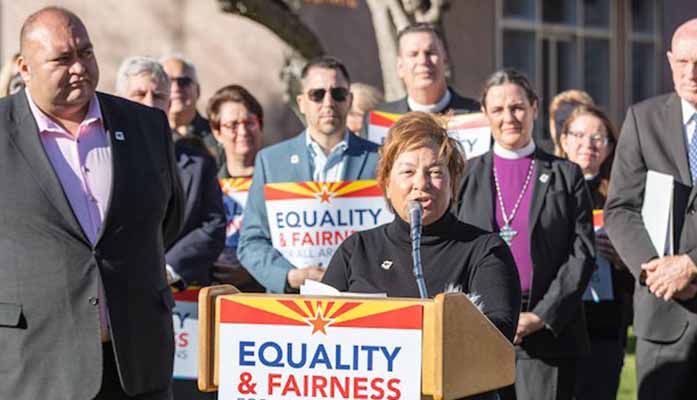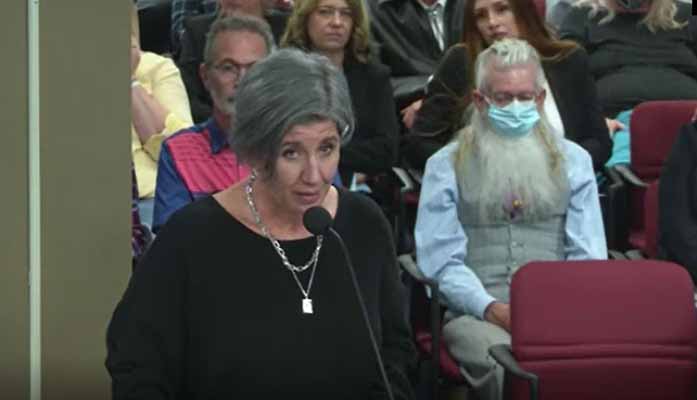
Lawsuits Against Schools For Violating Parental Rights Under Consideration
By Corinne Murdock |
Parents and guardians may be able to sue just about anybody that violates their rights under the Arizona Parents’ Bill of Rights, according to a bill that passed the Senate Judiciary Committee on Thursday. The bill, SB1049, also classifies parents’ rights violations as a class two misdemeanor and enables the attorney general or a county attorney to sue school districts or charter schools alleged to have violated parental rights. Courts may impose fines of up to $5,000 for each violation that occurred at the school.
The bill passed 5-3. State Senator Kelly Townsend (R-Mesa) introduced the bill. During Thursday’s committee hearing, Townsend explained that the provisions of this bill were already law but lacked accountability.
The Arizona Parents’ Bill of Rights codifies the rights of Arizona parents to direct their child’s education, upbringing, moral or religious training, health care decisions, as well as the rights to access and review all of their child’s records, including medical records.
State Senator Martín Quezada (D-Glendale) claimed that the “overwhelming majority” of parents’ frustrations could be resolved if they brought their issues to the educators for a conversation. Quezada said that this bill would only make parent-teacher relations more adversarial.
“Nobody is out to violate parent’s rights. Nobody is out to harm parents and nobody is out to make an enemy of parents,” said Quezada. “I want to encourage people to leave their emotions aside, have conversations with your school district leaders and then hold them accountable in the way that you have been granted at the school board elections.”
Quezada’s claim doesn’t align with comments from others within his party across the country, such as the viral comments of Wisconsin State Representative Lee Snodgrass (D-Appleton), who tweeted that parents should either homeschool or pay for private schooling if they wanted to have a voice in their child’s education. Snodgrass deleted the post, issuing a follow-up simultaneously backpedaling with an apology and claiming that those upset by her remarks were misinterpreting her.
“I deleted my Tweet since it was lacking in nuance and easily misinterpreted. I wouldn’t want anyone to think that parents do not have a role in their child’s public education-I sure did. I encourage all parents to engage in voting for school board, join [parent-teacher organizations] PTO and meet with teachers,” wrote Snodgrass. “To clarify, my point is we should be fully funding our public schools and that diverting funds away from our public schools only makes it harder for parents to have the relationships we deserve with our kids’ teachers and their schools. Of course parents need to have a say in their kids’ education and their classrooms! I’m a parent, and I have a say, as should every parent. I shouldn’t have been cavalier or glib—that wasn’t my intention, and I apologize. Carry on!”
State Senator Wendy Rogers (R-Flagstaff) rebutted Quezada’s remarks, reading a text she received from a constituent while the committee reviewed the bill, describing how the Flagstaff Unified School District (FUSD) governing board refused to work alongside parents.
One mother who spoke in favor of the bill reminded the committee that hundreds of Arizona educators signed a pledge last year to continue teaching what they desired, irrespective of parental consent or the law, in response to states implementing bans on Critical Race Theory. As of press time, there were over 200 Arizona educators that signed the pledge.
About 8,000 educators nationwide have signed that pledge. There are about 3.2 million public school teachers and 500,000 private school teachers in the country.
Those who signed onto the pledge as Arizona educators included the following:
Avondale: Natalie Cardenas
Bisbee: Etta Kralovec
Black Canyon City: Matthew Schock
Casa Grande: Sharon Tuttle
Chandler: Amy Shinabarger, Angela Thomas, Ann Cicero, Audra Johnson, Beth Herbert, Deanna Celaya, James Wallace, Judith Simons, Julia Palazzi, Melanie Ohm, Rachel Kulik, Shasta Payne, Teri Moser
Flagstaff: Russell Randall, Ricardo Guthrie, Michelle Novelli, Angelina Castagno, Beth Sanborn, Derek Thibodeau, Elizabeth Merrill, Erin Hiebert, Joe Wegwert, Leslie Grabel, Patricia Roach, Sarah Shamah, Stacy Clark, Tami Butters, Yvonne Parent
Fountain Hills: Vincent Sepe
Gila Bend: Josie McClain
Gilbert: Andrea Barker, Cary Tyler, Heather Gossler, Heather Schlemmer, Kaylie Aguilar, Kim Klett, Leda Devlieger, Monica Darugna, Rebecca Garelli, Stefanie Campanella
Glendale: Erin Chisholm, Carlos Velazquez, Craig Lewis, Deanna Bakker, Electra Stafford, Galindo Jack, Jamie Prichard, Kari Vargas, Lisa Cantella, Maggie Malone, Melanie Cobos, Nick Friedman, Rachel Schmidt, Romy Griepp, Valerie Sun
Goodyear: Jill Helland, Catherine Barnett, Nikole Brasch, Susan Hennessy
Laveen: Miguel Ramirez, Nancy Schwartz
Litchfield Park: Melissa England
Mesa: Elisabeth Tanner, Marissa Felix, Quiana Washington, Robin Dodder, Andrea Box, Anica Erickson, Ann Marie Geair, Anne Greer, Christina Bustos, Christina Jameson, Claudia Bloom, Dave Medley, Jacqueline Tambone, Julie Quiroa, Kay Crittenden, Kelly Wright, Kisha Delgado, Michelle Lantz, Paul Kreutz, Quiana Washington, Rachael Clawson, Steve Munczek
Paradise Valley: Justin Brooks
Peoria: Paige DeHaan, Breanna Malmos, Chelsea Charlton, Kaitlin Griffin, Melissa Girmscheid, Stephanie Churchill, Tina Sanders
Phoenix: Karen Hawkes, Susannah Keita, Natasha Alston, Kareem Neal, Admaira Roman, Wilma Rice, Tom Moore, Kerrilee Wing, Sariah Winn, Nishta Mehra, Kelsey Knutson, Courtney Rath, Darcy Heath, Kelly Cutler, David Lee Carlson, Jay Barbuto, Nicolas Culley, Alexandra Zamarron, Alicia Messing, Carla Garcia, Claudia Chiang, Erika James, Ginette Rossi, Janel Vaughan, Judith Robbins, Kelley Gribuski, Kristin Cervantez, Lauren Gaston, Lauren Spenceley-Sheoran, Michelle Schulke, Mike Sarraino, Rodrigo Palacios-Tenorio, Roger Baker, Sarah Bennett, Shana Hornstein, Susan Rego, Tara La O’Garcia
“The thought of censoring the truth of our history in this country at this time in our nation is horrifying. I will not be silenced by frightened white supremist[s],” wrote Karen Hawkes of Phoenix. “We cannot heal and move forward without knowing and understanding the roots of our institutionalized racism.”
Queen Creek: Joanna Auclair
Sahuarita: Dawn Demps
Scottsdale: Louis Sugar, Carole Ancona, Jan Kelly, Kandice Nelson, Mariah Moritz
Sun City West: Harriet Luckman, Stacy Green
Surprise: Jon Alfred, Paula Auble
Tempe: Kelsey McAlarney, Sharon Hansen, Bernadette Lissner, Carol Johnson, Cortney Milanovich, Danielle Degain, Deanna Smith, Dylan Wince, Haylee Newton, Jacob Bley, Jo Anne Craig, Lawdon Haglund, Leslie Ringer, Maren Mueller, Valerie Craig
“All Americans deserve to know the truth about our racist, white supremacist history of violence against BIPOC. I should not have had to have been 66 years old before I confronted this history for the first time,” wrote Sharon Hanson of Tempe. “Although the sins of my forebears are not my personal sins, the current racist situation America IS my problem. America will never move forward until, like Germany, we hold up our ugly past, learn what actually happened (not some whitewashed version of the truth), and endeavor to make reckoning with it all.”
Tucson: Susan Whorley, Katie Vera, Arthur Almquist, Megan Carney, Isabella Porchas, Margaret Chaney, Amber Leeson-Curtis, Lee Foulkes, Peter Blankfield, Julie Elvick, Victoria Bodanyi, Meghan Hipple, Alyssa Cossey, Jenna Brito, Andrea Espinoza, Elizabeth Valenzuela, Jessica Williams, Kari Warner, Kati Gilson, Rita Verdin, Ryan Knst, Adrian Provenzano, Alexandra Mazur, Alison Climes, Ann Marie Palmer, Avis Judd, Barbara Wayne, Brieanne Buttner, Caryl Crowell, Chelsea Forer, Chris Parisoff, Corey Knox, Corina Ontiveros, Devon Holden, Edvina Velagic, Eric Donaghy, Farid Matuk, Jennifer Mullet, Jennifer Quigly, Carole Edelsky, Jessica Bernal Meija, Jim Byrne, Kate Van Roekel, Wes Oswald, Kevan Kiser-Chuc, Kristel Ann Foster, Linda Archuleta, Manuel Palacios-Fest, Mario Garcia, Natalie Taylor, Nataly Reed, Peter Blankfield, Rachael Eggebeen, Rebecca Kristensen, Sheila Wilenksy, Steven Ernsky, Tom McElhaney
“I will not let the white establishment silence me. I will continue to teach an accurate account of history,” wrote Jenna Brito of Tucson. “This includes teaching about how racism, sexism, xenophobia, etc is deeply embedded into our society and how it continues to shape out [sic] experiences.”
Vail: Drew Fellows
Yuma: Dorothy Higuera
At least one Arizona educator didn’t identify their city or town: Andrea Barrera.
Some school districts and politicians contend that Critical Race Theory isn’t taught in schools — but that’s not what educators have to say. One of the educators who signed the pledge, School District of Philadelphia Special Education Compliance Manager (SPECM) Aisha Eubanks, explained that educators use alternative names for Critical Race Theory when teaching it. Eubanks works at Martin Luther King Jr. High School in Philadelphia, Pennsylvania.
“It is not Critical Race Theory in K-12 it is called being Culturally Responsive and teaching truth-based history, which is based on systemic racism,” wrote Eubanks. “I plan to continue doing just that.”
In addition to Culturally Responsive Education (CRE), sometimes called Culturally Responsive Instruction (CRI), other names for Critical Race Theory include social-emotional learning (SEL) and comprehensive equity plans.
Corinne Murdock is a reporter for AZ Free News. Follow her latest on Twitter, or email tips to corinne@azfreenews.com.




